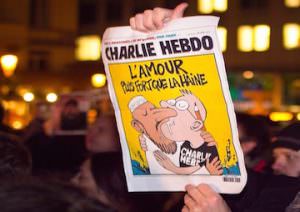Profiles in Courage: Women Journalists Speak Out
This year's winners of the International Women's Media Foundation's Courage in Journalism Awards are truly remarkable journalists who uphold the highest standards of the profession -- and, as they reveal in their speeches, risk paying the highest price for their perseverance and dedication.This year’s winners of the International Women’s Media Foundation‘s Courage in Journalism Awards are truly remarkable journalists who uphold the highest standards of the profession — and, as they reveal in their speeches, risk paying the highest price for their perseverance and dedication.
Here, we have reprinted the acceptance speeches of three of this year’s honorees at the foundation’s recent awards dinner in Los Angeles: Iraqi reporter Sahar Issa (who represented all six women from McClatchy’s Baghdad bureau), Zimbabwean independent journalist Peta Thornycroft, and Mexican activist and writer Lydia Cacho. Their stories are as inspiring as they are heartbreaking.
Editor’s note: A fourth IWMF honoree, Serkalem Fasil of Ethiopia, was unable to attend the awards event because of threats against her. Click here to read about her life and work.
Sahar Issa:
It is a great honor for me to stand here today.
To me, this award means that my colleagues and I have succeeded in what we set out to do; and that our voices have carried, through war, through death and sorrow, through sleepless nights and fear-driven days in an effort to reflect the picture of our country as we see it, and of our people as only we can truly know them.
To be a journalist in violence-ridden Iraq today, ladies and gentlemen, is not a matter lightly undertaken. Every path is strewn with danger, every checkpoint, every question a direct threat.
Every interview we conduct may be our last. So much is happening in Iraq. So much that is questionable. So much that we, as journalists, try to fathom and portray to the people who care to know.
In every society there is good and bad. Laws regulate the conduct of the society. My country is now lawless. Innocent blood is shed every day, seemingly without purpose. Hundreds of thousands have been killed for seemingly no reason. It is our responsibility as journalists to do our utmost to acquire the answers, to dig them up with our bare hands if we must.
But that knowledge comes at a dear price, for since the war started four and a half years ago an average of about one reporter and media assistant killed every week is something we have to live with.
We live double lives. None of our friends or relatives know what we do. My children must lie about my profession. They cannot under any circumstance boast of my accomplishments, and neither can I.
Every morning, as I leave my home, I look back with a heavy heart, for I may not see it again — today may be the day that the eyes of an enemy will see me for what I am, a journalist, rather than the appropriately bewildered elderly lady who goes to look after ailing parents, across the river every day. Not for a moment can I let down my guard.
I smile as I give my children hugs and send them off to school; it’s only after they turn their backs to me that my eyes fill to overflowing with the knowledge that they are just as much at risk as I am.
So why continue? Why not put down my proverbial pen and sit back? It’s because I’m tired of being branded a terrorist: tired that a human life lost in my country is no loss at all in the eyes of the world. This is not the future I envision for my children. They are not terrorists, and their lives are not valueless.
I have pledged my life — and much, much more — in an effort to open a window through which the good people in the international community may look in and see us for what we are, ordinary human beings with ordinary aspirations, and not what we have been portrayed to be.
Allow me, ladies and gentlemen, allow me to reach out. Help us to build bridges of understanding and acceptance. Even though the war has cast a dark shadow upon your nation and mine, it is not too late. I thank my bureau chief and our editors for retaining a high standard of balance and credibility, and I thank you all for being here today.
Good day.
Peta Thornycroft:
I work in a heartbroken country where women’s life expectancy is a shocking 34 years.
Zimbabwe has withdrawn from the world. Its life, its energy and resilience is eaten away.
Not for ideology, not because of so-called sanctions. Not because its sovereignty is under threat, as [Zimbabwean President] Robert Mugabe claims.
The shops are empty, the people are foraging for food in a country abundantly endowed with agricultural jewels, deep red soil and rain.
Zimbabwe holds the world’s record for inflation, nearly 8,000 percent. Where Robert Mugabe makes 100,000 percent profit on every U.S. dollar he exchanges on the black market, the only market.
At the end of apartheid in South Africa, where I have mostly worked, we journalists were elated.
When the Truth and Reconciliation Commission under Archbishop Desmond Tutu started investigations into the atrocities of apartheid, it began work in the libraries of South African newspapers.
I can truly say that I have made no difference in Zimbabwe.
Three weeks ago, I traveled hundreds of miles across the vast rural heartland of Mugabe’s strongholds.
Mugabe’s loyalists are polite, subdued, dependent and obedient. No opposition party can operate there.
I saw a new intake of Mr. Mugabe’s personal army, the youth militia, also known as “green bombers” for the color of their uniform and the violence they inflict on opposition supporters.
The small trading stores out there are as empty as supermarkets in the cities.
In July, Mugabe’s voodoo economics dictated that the price of retail goods be cut by 50 percent of production costs.
He did this because Christopher Dell, the outgoing U.S. ambassador to Zimbabwe, predicted that Zimbabwe would collapse by year’s end.
Mugabe’s generals — and Zimbabwe is ruled by the military — decided the private sector was [comprised of] saboteurs collaborating with the West for regime change.
So he slashed prices and arrested thousands of businessmen and -women.
There is no war in Zimbabwe except Mugabe’s war against his people.
Zimbabweans tried to change the regime at the ballot box, but Mugabe and his junta were too strong, too cunning, and Africa chose to ignore him.
For seven years the South African government, the country which gave the world Nelson Mandela, also stayed quiet and endorsed elections which were demonstrably violent and unfair.
Zimbabwe, which had the highest literacy rate in the Third World, now graduates children who can barely read. We don’t know the size of the population, nor the numbers dying of treatable diseases and HIV/AIDS, nor how many thousands cross into South Africa daily to send food to relatives at home.
Next year Mugabe, who will be 84 in February, will stand for re-election, seeking five more years to torment his people.
The people are too hungry, too fearful to oppose him.
Thank you for honoring me with this award.
Lydia Cacho:
I grew up in a middle-class family in Mexico City. My mother was a feminist psychologist.
When I was a little girl, she took me to the slums that surrounded the city. While she worked with women, I played with the little girls and boys my age. I was 5 years old when I learned [that] poverty, injustice and sexism had a face and a name.
By the age of 12, girls like me were pregnant as a result of incest, and when I began rebelling against those facts, my mom told me I had a responsibility to get an education and participate in social change.
In the streets, I was told it was best to keep quiet, look pretty.
As a teenager, I learned to defend myself from the patriarchal rules that promote violence, injustice and corruption. I knew I would never negotiate my dignity for apparent freedom.
I am a feminist activist, and I became a journalist 20 years ago in order to tell the stories of the millions silenced by the powers that be.
Some people say I am a heroine, but I am not. I am only a woman with principles [who] knows that in Mexico, my country, one in every five Mexicans are as poor as the poorest starving people in Africa.
I know that from the more than 300 femicides in Chihuahua, Mexico, none has been solved truthfully. I know the war in Iraq has cost $800 billion, and the World Bank calculated [that] we could fight world hunger with $500 billion.
I know that every year, 430,000 Mexican men and women risk their lives to cross the border, expelled by the Mexican government by poverty, corruption, impunity and violence.
I know a governor ordered my arrest and torture because I wrote the truth after I listened to little girls and boys trapped in a child-trafficking and pornography criminal network.
I know my life changed when I interviewed Cinthia, a 12-year-old girl that was exploited for sexual tourism in Cancun, after she told me: “I was only 7 when I found myself playing a game in my mind every time one of these men forced themselves in my small body. I imagined the body was not mine, that I was a raggedy doll, and I felt no pain. I tried suicide, but it did not work. I want to die before I turn 15. I do not like being a woman — it hurts.”
When I interviewed her to find out the names and features of the politicians and businessmen involved in the crimes, Cinthia touched my hand and asked me, “If you tell my story, will that stop them [from hurting] other girls?” I could only answer with a promise. The man is now in jail, and she is recovering and trying to learn how to be a free and happy woman.
I know if we adults do not stop child and women trafficking for sexual purposes around the world, in five years it will become a much better business than drug trafficking.
I know every year more than 600,000 women and children are trafficked for the “sexual trade” around the globe.
I know adult males make up 90 percent of the customers of sexually exploited children.
I know organized crime could not atrocity without the help of corrupted policemen, politicians and immigration agents.
I know in Cancun a night with a 6-year-old girl costs $2,000, and that an 11-year-old Salvadorean girl in Seattle, Wash., gave her pimp $500 a night until she was rescued.
I know adults, not children, run the bars where customers meet prostituted women and girls.
I know that there is hope, if we hold all clients and [their] protectors accountable, whether local or foreign, and ensure all victims are protected. I know to end a global crime takes global action.
I know when the Portuguese and British began [the] slave trade, no journalist questioned them.
I know things will not change with one single effort, but I am willing to risk it if I know one day little girls will have the chance to a life free of violence; if one day little boys learn other ways of being masculine without abusing others.
Mexico has signed all international treaties on human rights, and the government chooses — time after time — to turn a blind eye to the violation of the law, and [to] those rights. I am here because I have survived not only the criminal attempts, but also my own government’s will to break me.
Moral indignation is not enough to change the world; the International Women’s Media Foundation did not bring us here to simply pay tribute to a bunch of foreign brave women. I accepted to talk before you because I know that if we, as it happened, go to jail, are tortured or get killed for doing good journalism, we have witnesses to the stories that moved us to risk our lives for what we believe is ethical.
Now, after tonight, you share — as my mother said — the responsibility of knowing. May the power of ethical thinking and love be with you forever.
Your support matters…Independent journalism is under threat and overshadowed by heavily funded mainstream media.
You can help level the playing field. Become a member.
Your tax-deductible contribution keeps us digging beneath the headlines to give you thought-provoking, investigative reporting and analysis that unearths what's really happening- without compromise.
Give today to support our courageous, independent journalists.






You need to be a supporter to comment.
There are currently no responses to this article.
Be the first to respond.